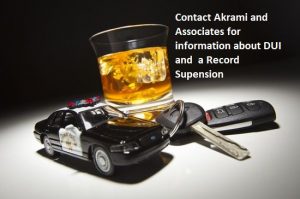What is Driving under the Influence
Driving under the influence (DUI) refers to the criminal offense of operating a motor vehicle while under the influence of drugs or alcohol. There are also other terminologies that refer to DUI, including driving while impaired/driving while intoxicated (DWI), operating while intoxicated (OWI), operating a vehicle under the influence of alcohol or drugs (OVI), drunk driving, operating while intoxicated (OWI), operating [a] vehicle under the influence of alcohol or drugs (OVI). In Canada, DUI has been considered a Federal Criminal Offence since 1921; it is also one of the most common types of criminal charge in the nation. If you have been convicted of driving under the influence in Canada, and you need a record suspension, then continue to read this blog for more information.
What Happens if I Drive while Being Drunk
If you have consumed alcohol, you are not supposed to drive. Nevertheless, everyone makes mistakes. If you are pulled over by an officer, the officer has reasonable grounds to suspect you may be driving under the influence of alcohol. Reasonable grounds include observations such as erratic driving or smell of alcohol on your breath. The officer may ask you first to perform a physical coordination test. After performing the physical coordination test, you may be requested to provide a breath sample, if the officer believes you are under the influence. If you fail to provide a breath sample, you may be requested to provide a blood or urine sample.
After Being Pulled Over
You may be arrested, if an officer has reasonable grounds to believe you committed DUI. If you fail to provide a breath sample, your driver’s license can be suspended for 90 days. In Alberta, your driver’s license can be suspended for 6 months if you cause any bodily harm.
If you are convicted of driving under the influence, you are most likely required to pay a fine and receive a license suspension. You may be required to take some rehabilitative courses as well. It is a criminal offense if you fail to comply with the tests without a reasonable excuse, and the officer was operating on reasonable grounds to pursue breath, blood or urine samples. Nevertheless, if the officer is requesting you to provide the samples without reasonable grounds, then the case may be in violation of Section 8 of the Canadian Charter of Rights and Freedoms.
If you submit a breath sample that is not quite at .08 but is still a considerable amount, you may still be subject to penalties including suspension of your driver’s license for a period of time. Each province and territory has different allowable blood alcohol concentration (BAC), and each jurisdiction has differing penalties ranging from 12 to 24 hours suspension.
Penalties of DUI
Since 2008, the Government of Canada has become more vigilant about DUI. That being said, the penalties have become more rigid and stiffer for impaired driving. This was introduced in the Tackling Violent Crime Act. The new measures include:
- A BAC of zero for all new drivers in all provinces.
- Allowing the use of field sobriety tests by officers under reasonable grounds.
The government of Canada has increased penalties to:
- First offence: $1000 fine
- Second offence: 30 days in jail
- Third offence: 120 days in jail
What if I Have Been Convicted of DUI
There are many consequences of your DUI. For example, you may be rejected by a potential employer after failing a background check. Alternatively, you may lose your current job if your employer decides to do a background check. In order for you to erase your DUI record in Canada, you will need to obtain a record suspension (formerly a pardon).
If you are a foreign national who is travelling to Canada, you may be denied entry. If you want to come to Canada with a DUI on your criminal record, then you will need to overcome your inadmissibility by applying for a temporary resident permit or applying for criminal rehabilitation.
How do I Get a Pardon/Record Suspension
In order to apply for a record suspension, you need to pay your fines as soon as possible. If five years have elapsed since the date your fine payment, you may apply for a pardon. You can apply for a pardon if the offense you committed was in Canada through the Parole Board of Canada. It takes an average of 12-24 months for a record suspension application to be processed and granted in Canada. Also, it takes roughly 3-10 months to prepare the record suspension application, because many documents must be collected. Therefore, it is a good idea to proactively start preparing the application. In fact, it would be proactive to start preparing your application sometime before you become eligible for a record suspension.
Contact Akrami & Associates
As previously mentioned, Canadian government is very strict when it comes to assessing DUI. In order to compile a strong record suspension application, you will need to prepare for the correct documents. Having to prepare all the required documents can very confusing and exhausting. As a result, it is highly recommended that you seek out professional and experienced help prior to submitting the application. Akrami & Associates work and have experience with many different immigration matters. We have helped many of our clients with criminal inadmissibility issues. Please feel free to contact Akrami & Associates at 416-477-2545 for more information, or if you would like to book a consultation with an immigration professional for more advice.
With Akrami & Associates, there is always a way!


